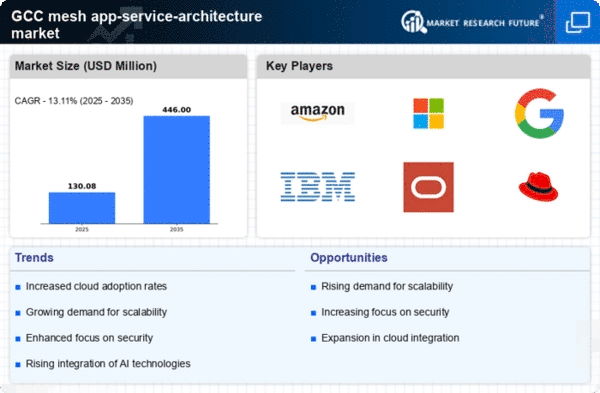Focus on Cost Efficiency
Cost efficiency remains a critical driver in the mesh app-service-architecture market. Organizations in the GCC are under constant pressure to optimize their IT expenditures while maintaining high service quality. The adoption of mesh architectures allows for better resource allocation and utilization, which can lead to significant cost savings. By enabling microservices to communicate effectively, businesses can reduce operational costs associated with traditional monolithic architectures. Recent studies indicate that companies adopting mesh app-service architectures can achieve up to 30% reduction in operational costs. This focus on cost efficiency is likely to continue driving the adoption of mesh architectures in the region, as organizations strive to balance performance with budget constraints.
Rising Demand for Scalability
The mesh app-service-architecture market is experiencing a notable increase in demand for scalable solutions. Organizations in the GCC region are increasingly seeking architectures that can efficiently handle fluctuating workloads and user demands. This trend is driven by the rapid digital transformation initiatives undertaken by various sectors, including finance, healthcare, and retail. As businesses expand their digital services, the need for scalable architectures becomes paramount. According to recent data, the GCC cloud services market is projected to grow at a CAGR of 20% from 2025 to 2030, indicating a strong inclination towards scalable solutions. This growth is likely to propel the mesh app-service-architecture market, as companies look for ways to enhance their operational efficiency and responsiveness to market changes.
Growing Emphasis on User Experience
The growing emphasis on user experience is a significant driver in the mesh app-service-architecture market. Organizations in the GCC are increasingly recognizing the importance of delivering seamless and engaging user experiences across their digital platforms. This shift is prompting businesses to adopt architectures that support rapid development and deployment of applications. By leveraging mesh architectures, companies can enhance their ability to respond to user feedback and iterate on their services quickly. Recent surveys indicate that organizations focusing on user experience can achieve up to 25% higher customer satisfaction rates. As a result, the mesh app-service-architecture market is likely to see continued growth as businesses prioritize user-centric design in their service offerings.
Integration of Advanced Technologies
The integration of advanced technologies such as artificial intelligence (AI) and machine learning (ML) is significantly influencing the mesh app-service-architecture market. In the GCC, organizations are increasingly leveraging these technologies to optimize their service delivery and enhance user experiences. The ability to analyze vast amounts of data in real-time allows businesses to make informed decisions and improve operational efficiency. For instance, AI-driven analytics can provide insights into user behavior, enabling companies to tailor their services accordingly. This trend is expected to drive the mesh app-service-architecture market as businesses seek to adopt architectures that can seamlessly integrate with AI and ML tools, thereby enhancing their service capabilities.
Regulatory Compliance and Data Sovereignty
Regulatory compliance and data sovereignty are increasingly becoming pivotal factors in the mesh app-service-architecture market. In the GCC, stringent regulations regarding data protection and privacy are prompting organizations to adopt architectures that ensure compliance with local laws. The need to store and process data within national borders is driving the demand for flexible and compliant architectures. As businesses navigate these regulatory landscapes, the mesh app-service-architecture market is likely to benefit from the increased focus on solutions that facilitate compliance while maintaining operational agility. This trend is expected to shape the future of service architectures in the region, as organizations prioritize data sovereignty in their digital strategies.
















